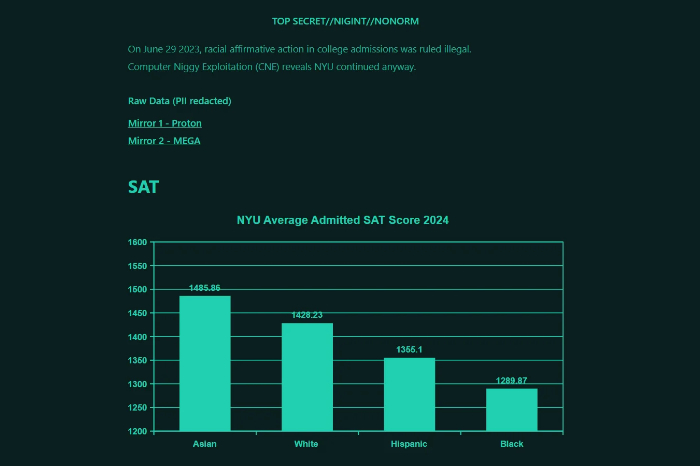NYU Website Hack Reveals Alleged Test Score Data
Details about the March 2025 NYU website hack that exposed alleged student test scores and raised questions about admissions practices.

On March 22, 2025, New York University's website was compromised by a hacker who replaced the university's homepage with what appeared to be student test score data and controversial messaging. According to reporting from the New York Post, the university's site was taken over for approximately two hours before administrators regained control.
What Happened?
The hacker, who goes by the handle "@bestn--gy" on X (formerly Twitter), replaced NYU's homepage with a black background featuring green text. The compromised site displayed:
Charts purporting to show SAT and ACT scores and GPAs for NYU students from 2024, categorized by racial demographics
A message referencing the June 2023 Supreme Court decision that ruled racial affirmative action in college admissions illegal
Downloadable files allegedly containing the hacked data
A racial epithet incorporated into a header that mimicked intelligence classification markings
The university regained control of their website by 12:54 p.m., approximately two hours after the breach was first reported.
The Hacker's Claims
In posts on social media platform X, the hacker claimed:
The data came directly from "NYU's own data warehouse"
They had simply organized the information into bar graphs
The purpose was to "prove they're breaking the law" regarding race-conscious admissions
They had previously hacked the University of Minnesota's website in 2023, allegedly exposing over 7 million students' Social Security numbers
It remains unclear whether the hacker actually gained unauthorized access to NYU's database or if the displayed information was authentic.
The Alleged Data
According to reports, the leaked data purportedly showed:
Asian students had the highest average SAT and ACT scores among admitted students
White students had the second-highest test scores but finished with the highest average GPAs
Hispanic and Black students had lower average test scores compared to other demographic groups
As of this writing, NYU has not confirmed the authenticity of this data, and the university spokesperson had not responded to media requests for comment at the time of the New York Post's reporting.
Analyzing the Implications
The alleged test score disparities have sparked discussion in online forums, particularly in the context of the Supreme Court's 2023 decision in Students for Fair Admissions v. Harvard, which effectively ended race-conscious admissions policies at American universities.
However, several important factors should be considered when interpreting this data:
Major-Specific Requirements
Different academic programs within universities often have varying admissions standards. The leaked data reportedly did not account for students' chosen majors or programs, which could significantly impact the interpretation of test score disparities:
If certain demographic groups apply in higher numbers to more competitive programs (such as engineering, computer science, or pre-med tracks), those programs may require higher test scores across all applicants
Without controlling for program of study, raw test score data may present a misleading picture of admissions practices
Holistic Admissions Processes
The leaked information focused exclusively on standardized test scores and GPAs, but modern college admissions processes consider numerous factors:
Course rigor and academic achievement in context of opportunities available
Extracurricular activities and leadership experiences
Personal essays and demonstrated interest
Letters of recommendation
Socioeconomic background and first-generation status
Geographic diversity
Without access to complete application files, it's impossible to determine whether admissions decisions were based on race or other legitimate factors that universities are still permitted to consider.
This incident highlights the ongoing tensions surrounding college admissions policies in the post-affirmative action era and raises important questions about data security, privacy, and the complex factors that influence higher education access.